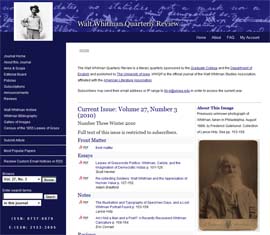 The Walt Whitman Quarterly Review (WWQR), a literary quarterly sponsored by the University of Iowa Graduate College and the Department of English, is now available online at http://ir.uiowa.edu/wwqr/. The official journal of the Walt Whitman Studies Association is edited at Iowa by editor Ed Folsom and managing editor Blake Bronson-Bartlett.
The Walt Whitman Quarterly Review (WWQR), a literary quarterly sponsored by the University of Iowa Graduate College and the Department of English, is now available online at http://ir.uiowa.edu/wwqr/. The official journal of the Walt Whitman Studies Association is edited at Iowa by editor Ed Folsom and managing editor Blake Bronson-Bartlett.
Less than a month after the site’s public launch, The Walt Whitman Recording, has already become the second-most accessed item in Iowa Research Online, the university’s institutional repository. The article, by Folsom, describes the rediscovery of the “tape-recording of what may be an 1889 or 1890 wax-cylinder recording of Walt Whitman reading four lines of his late poem ‘America.'” The audio has gained broad exposure recently in a Levi’s Go Forth commercial.
All journal back issues, beginning with the first volume in 1983, up to one year ago are full-text searchable from the site. Current issues are accessible to subscribers only. The site provides information about subscribing, announcements about Whitman-related matters, access to the searchable bibliography of everything written about Whitman from 1840 to the present, and up-to-date information on the census of the 1855 edition of Leaves of Grass. Soon, articles will also be available through bibliographic entries in the Walt Whitman Archive.
WWQR is the latest journal to be added to Iowa Research Online, a dynamic archive of the research produced by faculty, researchers, and students, from published articles in peer-reviewed journals to presentations, theses, dissertations, and unpublished papers. WWQR is among four locally published e-journals hosted by the University of Iowa Libraries, with an additional two currently in production. To find out more about the Libraries support for locally journal publishing, see the Libraries e-journal hosting information. As with all efforts related to Iowa Research Online, this project was part of a broader Libraries initiative to support the transformation of scholarly communications.
—Nicole Saylor
Head, Digital Library Services